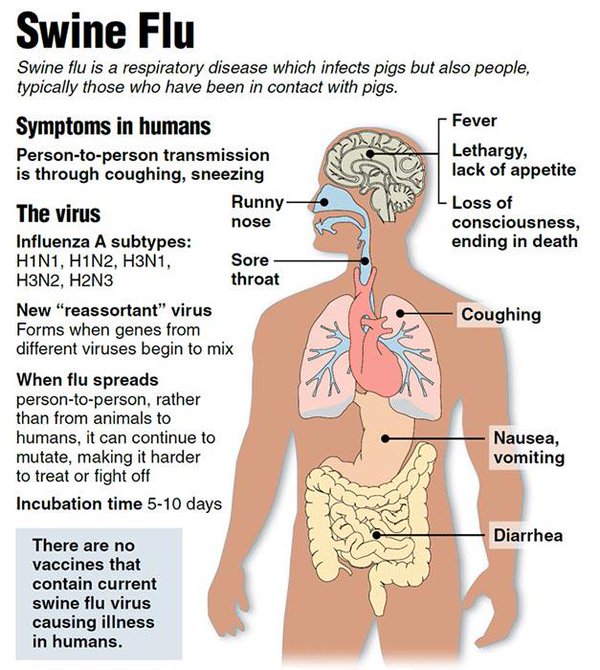
Things You Need To Know About Swine Flu
Swine Flu, also known as Swine influenza, is a transmissible respiratory disease that affects pigs. It can be passed from one pig to another if they get in contact directly, or via tiny air particles, or if a pig comes in contact with a surface infected with the virus through indirect contact. The strains of the swine flu virus infect pigs, but can infect humans too, which are referred to as cases of human swine flu. Here is a list of the swine flu causes, symptoms, and other information that you should know about the disease:
Causes
A virus causes Swine Flu.The most common strain or sub type is influenza type A H1N1, which causes the infection in people too,though this virus is not the same as the H1N1 human virus. The naming of the sub types is carried out by using the letter H and N which stand for the proteins present on the virus’s surface. This method of naming helps in distinguishing between different sub types.
Influenza viruses keep on changing their genes repeatedly in a process known as mutation. If there is an occurrence of the swine flu virus in humans, it means that the virus has carried out this process to cause such a condition in humans. And as humans do not have a natural immunity or protection to the virus, they become ill.
Humans can come in contact with the virus when they directly come in contact with pigs, such as by working in slaughterhouses or pig farms. Also, swine flu can be transmitted from person to person, with the virus entering through the nose, mouth, or/and eyes when sneezing or coughing. Plus, if a person who touches their mouth, nose or, eyes after touching an infected surface can get infected with the virus.
Symptoms
The symptoms of swine fluin people bear similarity to the symptoms of seasonal human influenza. People who have swine influenza may witness the following symptoms:
- Dry cough
- Headache
- Fever
- Sore throat
- Appetite loss
- Lack of energy
- Tiredness
- Runny nose
- Nasal congestion
- Nausea
- Diarrhoea
- Vomiting
Diagnosis
In order to recognise the flu virus, a doctor will carry our laboratory tests or diagnose you on the basis of symptoms. If you have lately visited a place where there is already an ongoing swine flu outbreakamong the people, if you have asthma, are pregnant, or are an elderlyperson (cases of high risk of infection) or have visited a pig farm, petting zoo, country fair, etc., you must pay a visit to your doctor. Also, make sure that you make a callto the doctor beforehand, so that you don’t infect anyone in the premises of the doctor’s office and also to provide them with time to prepare for your visit.
Prevention
There is no vaccination to protect people from swine flu, although there are vaccines for pigs. However, you can follow some tips related to the prevention of swine flu to decrease its risks.
- Avoid any contact with people who have swine flu symptoms or people who are sick.
- Wash your hands with soap and water thoroughly and repeatedly. Give a good 15 seconds to washing your hands to ensure proper sanitization. You can also use alcohol-based sanitizers.
- Get an influenza immunization done annually. Though, it may not offer you protection against swine flu, but can protect you from some human influenza strains. Doing so will prevent you from being in a situation wherein you get infected by both swine and human influenza during the same time.
- At last, inculcate good habits in your daily routine, such as get good sleep, eat a nutritious diet, and maintain physical activity.
Knowingall this about swine flu becomes important so that you can prevent the risk of it occurring in the future; this knowledge will helpup to a large extent in that regard.


